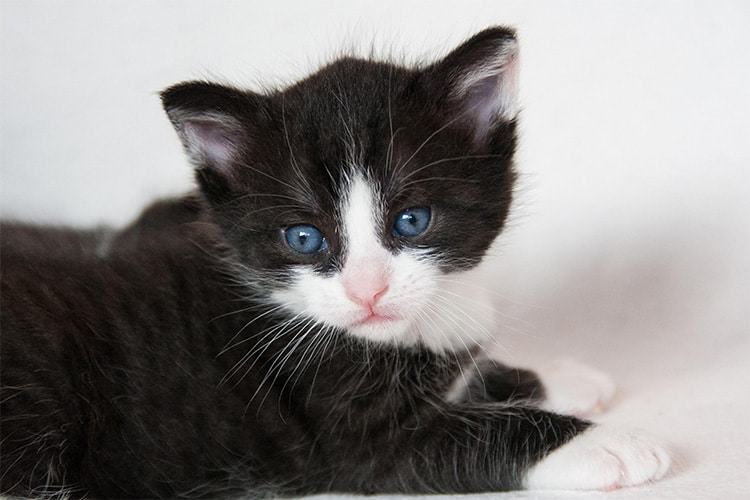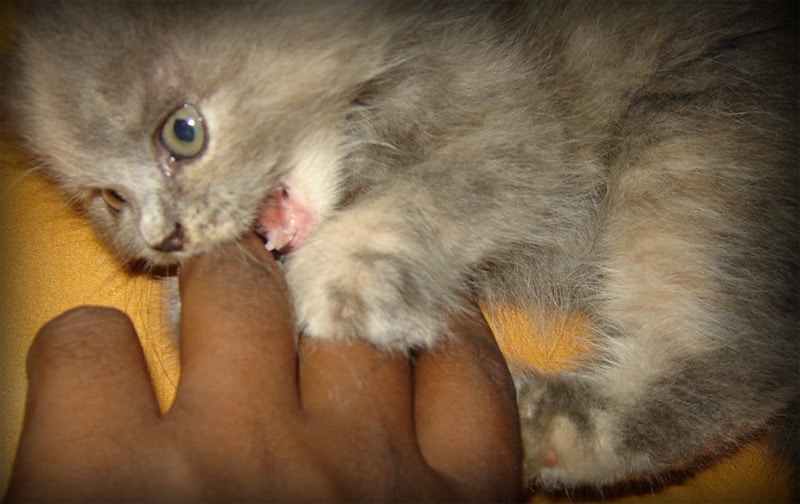How to Help A Teething Kitten
Just like little babies, kittens will go through a stage of teething, which can be painful and result in your little ball off fluff chewing up everything in sight. So, how do you help ease his discomfort (and save your slippers in the process)? Let’s explore the best ways to help a teething kitten.
Contents
The Teething Process
Kittens experience two bouts of teething, the first begins at around two weeks of age, when they cut their first deciduous (baby or milk) teeth. First on the scene are the incisors, closely followed by the canine teeth (fangs), and then the premolars. Kittens have twenty-six deciduous teeth to cut, no wonder the teething process can be tricky!
Following this there’s a second set of (permanent) teeth that start to push through. There are thirty to cut in all and the first of the new teeth (incisors) begin to show up at around eleven weeks. These are closely followed by the four canine teeth and then the ten premolars. By the age of six months your kitten will have most of his adult teeth – there are four more molars to push through, but these don’t usually arrive until the kitten is more mature.

What to Expect When Your Kitten Is Teething
Teething can equal sore gums for your little fluff ball, whilst the loss of baby teeth may hinder his efforts to eat. You might notice that he is a little cantankerous (so would you be if you had toothache)! Give your kitten lots of care and attention and be prepared for a challenging time ahead. Teething kittens will experience the urge to chew and will seek out whatever they can get their teeth into to satisfy their need to bite down and ease the irritation caused by the arrival of new teeth.
Expect to retrieve lots of half eaten objects from round your home if you’re not packing things away! Of course cats bite for other reasons too, so if your kitty has gone past the teething stage you need to explore the other potential reasons for his biting behavior.
Watch Out for Dangers
When we say kittens will chew anything, we mean virtually anything! This includes items that may injure or hurt your beloved pet.
Just like babies, kittens do not have an understanding of potential hazards – so you have to spot and eradicate risks for them. Electrical cords and wires are a particular worry and can do some serious damage, as are loose items that are left lying around such as wool and knitting needles. It’s also wise to evaluate the plant life you have adorning your home; a kitten cannot distinguish between regular greenery and plants that are considered to be toxic to felines.
Preventative Measures
There are a few things you can do to make your home safer for your kitten, first off remove any potentially toxic flowers and plants, this includes: Amaryllis, Autumn Crocus, Azaleas, Castor Bean, Chrysanthemum, Cyclamen, English Ivy, Kalanchoe, Lilies, Marijuana, Narcissus Bulbs, Oleander, Peace Lily, Pothos, Rhododendrons, Sago Palm, Spanish Thyme, Tulip Bulbs and Yew. You don’t want to have to rush your beautiful pussy cat to the vets with a case of poisoning just because he wanted to find a nice leaf to chow down on!
There are also a whole host of foods that are considered unsafe for a cat to munch, but unless you’re planning on letting kitty lose in the cupboards he should be fine if they are kept stored away.
Secondly cover up those electrical wires, lose cables scream out “play with me,” and your kitten will just see a long rope like toy that’s ripe for chomping. You can purchase plastic covers that will act as mini shields and cover up those pesky and potentially dangerous cables.
You should have a general sweep of all areas that your kitten strays into and take a good look around to see if there are any potential hazards, see it as a risk assessment for your feline and resolve to safely stow away anything that’s likely to tempt your kitten. You can also purchase a chew deterrent spray that’s designed to put your kitten off taking a bite out of anything that’s not on the menu, this bitter spray is formulated to taste nasty, so your kitten should think twice if he gets a mouthful.

Encourage Play
Whilst you can spend an age covering up, stowing away and kitten-proofing your home you shouldn’t prevent your kitty from chewing altogether.
He needs to cut his teeth and will feel much better if he has something rough and tough to chomp on. There are plenty of teething toys on the market, in various shapes and sizes and made from different materials.
Take care not to pick out toys that have lots of lose parts or things that can be bitten off, such as buttons and feathers, these can cause problems for your kitten. Choose an appropriate selection that will garner your kittens interest and inspire him to bite, gnaw and munch something other than your favorite high-heels!
Look After Your Kitten
Looking after a kitten is a big responsibility and a teething kitten will be even more demanding! Plenty of TLC is the order of the day, be mindful that your kitty may have a sore mouth and not keen to play rough games (such as tugging a rope). It’s also a good idea to relent with any tooth brushing during this period (sore gums are sensitive and you don’t want your kitten to associate a toothbrush with pain and discomfort).
You should also consider what type of food is best at this time, soft food will be easier to eat (no hard bits to crunch down on). Teething can be difficult, but if you follow these simple tips you should be able to reduce your cats discomfort.


